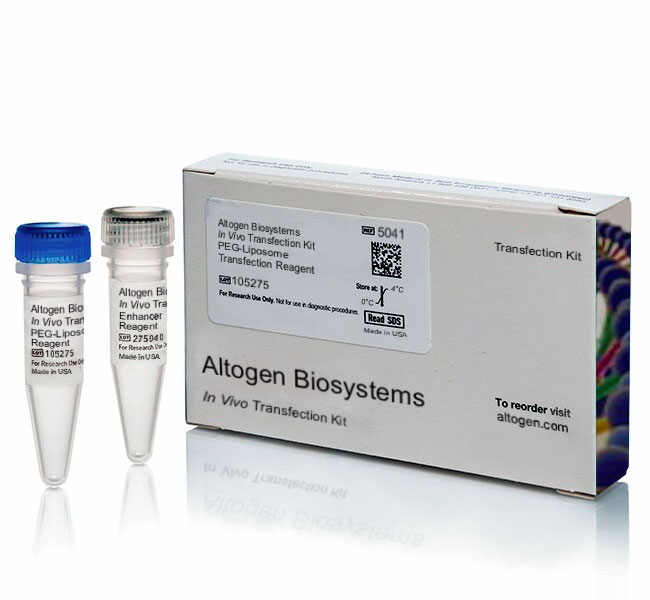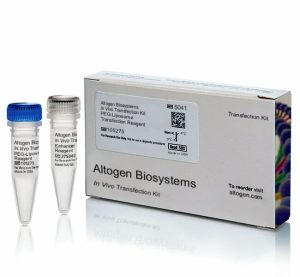Description
Purchase Orders: Click “Add to Cart” button to order, then email PO to orders@altogen.com.
Product Availability: In Stock.
PEG-Liposome In Vivo Transfection Kit
siRNA, DNA and protein in vivo delivery reagent
Product Description:
PEGylated liposome-based reagent for efficient and safe delivery of various molecules into spleen, kidney, pancreas, liver, and multiple tumor types via systemic administration. The PEG modification ensures the reagent is biodegradable, resulting in no detectable toxicity or any measurable inflammatory response. The complexes formed are stable in serum for at least 16 hours. Reagent can effectively deliver any neutral and negatively charged molecules (si/sh/miRNA), plasmid DNA, and small proteins. This kit has been functionally tested in mice and rats, demonstrating reliability and effectiveness in vivo.
Altogen’s PEG-Liposome In Vivo Transfection Reagent
- PEGylated liposome based reagent
- No detectable toxicity or inflammatory response due to biodegradable PEG modification
- Complexes are stable in serum for at least 16 hours
- Efficient delivery to the spleen, kidney, pancreas, liver, and multiple tumor types via systemic administration
- Efficient delivery of negatively charged molecules including siRNA (shRNA, microRNA), plasmid DNA, and protein
- Functionally tested in mice and rats
- Applicable for plasmid DNA/siRNA(shRNA) co-injection
- Download PEG-Liposome in vivo transfection protocol: [PDF] [Word]
- Download PowerPoint presentation for PEG-Liposome in vivo transfection kit: [PPT]
- Download safety data sheet: [PDF]
- Developed and manufactured by Altogen Biosystems
Modes of administration:
- Systemic intravenous (i.v.) injection
- Direct intratumoral (i.t.) injection
DATA
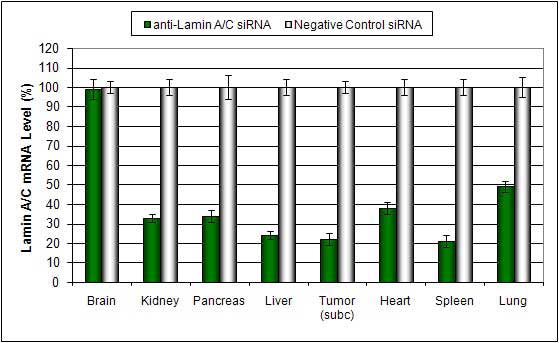
Figure 1. Systemic administration (i.v.) of Liposome-PEG based In Vivo reagent conjugated with siRNA targeting Lamin A/C mRNA or non-silencing control siRNA following the recommended protocol. Tissues were collected and RNA isolated 48 hours after first injection. Samples were analyzed by qRT-PCR for Lamin A/C gene expression levels. Ribosomal RNA levels were used to normalize the Lamin A/C data. Data are means ± SD (n=6).
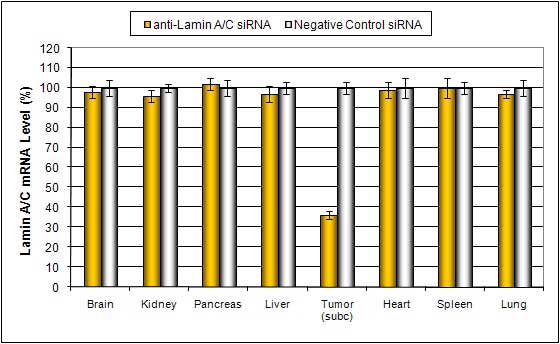
Figure 2. Intratumoral administration (i.t.) of Liposome-PEG based In Vivo reagent conjugated with siRNA targeting Lamin A/C mRNA or non-silencing control siRNA following the recommended protocol. Tissues were collected and RNA isolated 48 hours after first injection. Samples were analyzed by qRT-PCR for Lamin A/C gene expression levels. Ribosomal RNA levels were used to normalize the Lamin A/C data. Data are means ± SD (n=6).
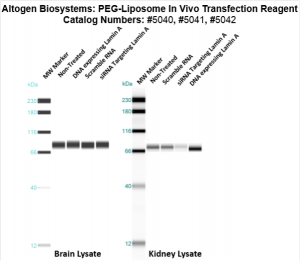
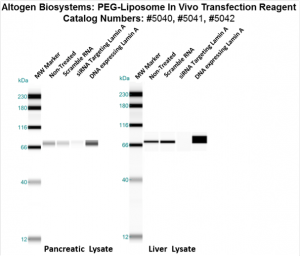
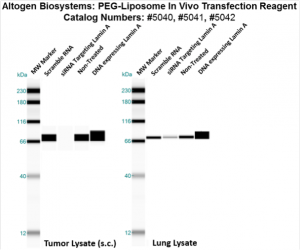
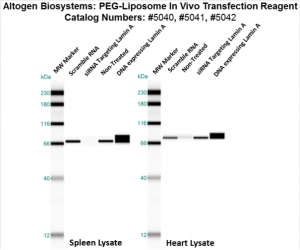
Figure 3. Systemic administration (i.v.) of PEG-Liposome In Vivo Transfection Reagent conjugated with 80 ug of chemically modified siRNA targeting Lamin A/C mRNA or non-silencing control siRNA following the recommended protocol. Tissues (Liver, Brain, Muscle, Kidney, Tumor, Heart, Spleen, Lung) were collected and total protein fraction isolated 72 hours after first injection. Samples were analyzed by Western Blot Analysis for Lamin A/C gene expression levels.
PEG-liposomes are a type of lipid-based nanoparticle that consist of a lipid bilayer surrounding an aqueous core, with polyethylene glycol (PEG) chains attached to the surface of the bilayer. PEG-liposomes are used in drug delivery, particularly in cancer treatment, due to their ability to selectively accumulate in tumor tissues. The PEG chains on the surface of the liposomes act as a stealth layer, reducing the clearance of the nanoparticles by the immune system and increasing their circulation time in the bloodstream. This allows for increased accumulation in the tumor tissue, where the liposomes can release their drug payload to target cancer cells. PEG-liposomes have several advantages over traditional chemotherapy drugs. They can selectively target tumor tissues, reducing the toxic effects on healthy tissues. They can also encapsulate hydrophobic drugs that are otherwise difficult to administer, and can provide sustained release of the drug over time. In addition to drug delivery, PEG-liposomes can also be used for gene therapy via encapsulation of plasmid DNA or siRNA and allowing for the targeted delivery of genetic material to specific tissues. However, there are certain limitations to the use of PEG-liposomes in drug delivery due to highly specialized formulation and manufacturing requirements, otherwise PEG-liposomes can be unstable and prone to aggregation.
Selected in vivo transfection product citations (ALTOGEN® IN VIVO Transfection Kits used in the following publications):
- Nature. 2008 454(7203):523-7. Innate immunity induced by composition-dependent RIG-I …Saito et al [PDF]
- Am J Pathology. 2010 177(4):1870-80. Role of ocular complement factor H in a murine model … Lyzogubov et al [PDF]
- Nature Biotechnology. 2011 29(4):341-5. Delivery of siRNA to the mouse brain by … Alvarez-Erviti et al [PDF]
- Cancer Research. 2011 71(15):5144-53. Inhibition of miR-193a expression by… Iliopoulos et al [PDF]
- RNA. 2010 16(11):2108-19. RNase L releases a small RNA from HCV RNA that refolds … Malathi et al [PDF]
- Diabetologia. 2012 55(7):2069-79. The p47phox- and NADPH oxidase organiser 1 … Youn et al [PDF]
- British Journal of Cancer. 2012 107(3):516-26. TIGAR induces p53-mediated cell-cycle … Madan et al [PDF]
- Hypertension. 2014 63(2):353-61. Tissue transglutaminase contributes to … Liu et al [PDF]
- Circulation Research. 2010 15;107(8). Kruppel-like factor-4 transcriptionally regulates … Cowan et al [PDF]
- Hypertension. 2012 59(1):158-66. Role of uncoupled endothelial nitric oxide synthase … Gao et al [PDF]
- Jounal of Biological Chemistry. 2012 287(4):2907. Chaperoning of mutant p53 protein … Gogna et al [PDF]
- PLoS Pathogens. 2012 8(8) Uridine composition of the poly-U/UC tract of HCV RNA … Schnell et al [PDF]
- J Proteome Res. 2012(11) Retinal proteome analysis in a mouse model of oxygen-induced … Kim et al [PDF]
- J Transl Med. 2010 15;8:133. Prevention of hyperglycemia-induced myocardial apoptosis … Zhang et al [PDF]
- Mol Cell Biol. 2013 33(7). SCO2 induces p53-mediated apoptosis by Thr845 phosphorylation … Madan et al [PDF]
- Hypertension. 2015 65(2):430-9. Neurokinin 3 receptor and phosphocholine transferase… Parchim et al [PDF]
- Gastroenterology. 2011 141(2) Differential type I interferon-mediated autophagic trafficking … Desai et al [PDF]
- PLoS Pathog. 2014 10(10) Exosomes from hepatitis C infected patients transmit HCV … Bukong et al [PDF]
This reagent is crucial for preclinical research as it provides a reliable and non-toxic method for studying gene and protein function in vivo. Its ability to deliver a wide range of molecules to specific organs and tumor types makes it an invaluable tool for developing and testing new therapeutic strategies. The stability and effectiveness demonstrated in animal models ensure that researchers can confidently use this reagent to advance their studies from the lab to potential clinical applications. The PEGylated liposome-based reagent is a highly efficient and safe system for delivering various molecules into key organs such as the spleen, kidney, pancreas, liver, and multiple tumor types via systemic administration. The PEG modification ensures the reagent is biodegradable, leading to no detectable toxicity or inflammatory response.
Altogen Research Services:
Altogen Labs offers GLP-compliant safety and efficacy preclinical research studies tailored for drug development. Our comprehensive biology CRO services include over 90 xenograft models for cancer research, development of stable expression cell lines, ELISA assays, comprehensive safety and toxicity assessments.
Volume Options:
- 0.5 ml – 10 injections (Catalog #5040)
- 1.5 ml – 30 injections (Catalog #5041)
- 8.0 ml – 160 injections (Catalog #5042)
- 25 ml – 50 rat injections or 500 mouse injections (Catalog #5043)
Purchase Orders: Click “Add to Cart” button to order, then email PO to orders@altogen.com.
Product Availability: In Stock.





